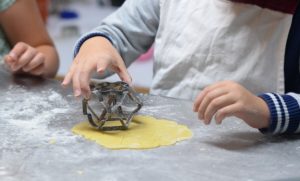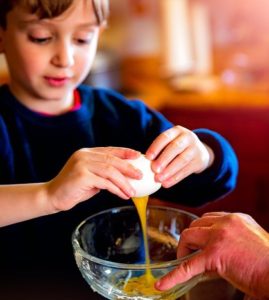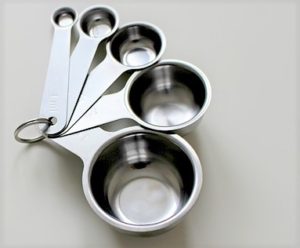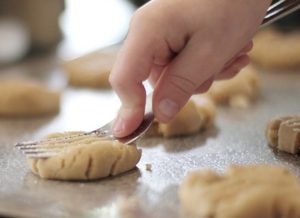 Children enjoy being helpers and doers. Using their hands to create something gives them a great sense of accomplishment. So, take time this summer to teach your children how to cook. The payoff might just be breakfast in bed some time in the future. Until that time comes, cooking with kids has many other rewards.
Children enjoy being helpers and doers. Using their hands to create something gives them a great sense of accomplishment. So, take time this summer to teach your children how to cook. The payoff might just be breakfast in bed some time in the future. Until that time comes, cooking with kids has many other rewards.
Rewards of Teaching Kids to Cook
- Great conversations can happen when adults and kids are in the same room, the TV is off and hands are busy.
- Math skills are reinforced when children weigh and measure ingredients, cut foods in equal size pieces and divide portions.

- Following directions is a skill that comes in handy when cooking from a recipe or completing a school assignment.
- Fine motor skills and muscle coordination are developed as children learn to use kitchen tools. A two year old should not be assigned to chop vegetables with a sharp knife, but they can successfully cut a banana with a plastic table knife or stir.
- Children take pride in what they make, whether it is a finger painting or a peanut butter and banana sandwich. If you want kids to eat more fruits and vegetables, have them make dishes with these foods.
- Once kids learn the basics, preparing foods can be an opportunity for them to express their creativity.
Tips for Success When Teaching kids to Cook:
- It’s always a good idea to start cooking with a review of the importance of clean hands and surfaces to prevent foodborne illness.
- No two children are the same, when it comes to the cooking skills they are ready to learn.
- Start with simple tasks, show them how to do it, and then let them give it a try.
- Don’t worry if something gets spilt, plan on it.
- Have lots of paper towels and a broom within reach and extra ingredients to measure.
More Food Safety Tips When Teaching Kids to Cook:
1. Wash hands with soap and water, rubbing soapy hands together for 20 seconds and rinsing with warm water before and after handling food.
2. Clean counter tops, cutting board and utensils before and after preparing food.
3. Wash hands, utensils and surfaces again after handling raw meat, poultry or fish and before preparing other foods.
4. Make sure perishable foods like milk, eggs and meats don’t stay at room temperature for more than 2 hours, including preparation and serving time.


OK so now that I have read your suggestions I can bring my 98-year-old Mom into the kitchen to help me fix some meals…….She maybe 98 years old but does not remember how to cook so this is great! Seriously!
LOVE this article–so many great tips for getting kids excited about making things, eating healthy foods, bonding with adults/siblings–and doing it all safely!!